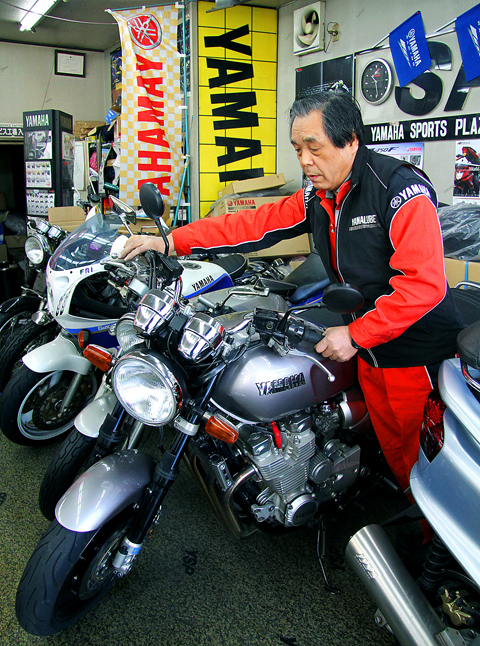Japanese motorcycle maker Yamaha Motor said yesterday it plans to close seven factories globally, shedding 1,000 jobs in an effort to recover from a US$2.4 billion annual loss.
Yamaha, the world’s second-biggest motorcycle manufacturer after Honda, said it would cut 200 jobs overseas, on top of the 800 in Japan announced last week.
The streamlining is in addition to a 10 percent reduction in the company’s global work force of 17,000 already under way, a Yamaha spokesman said.

PHOTO: BLOOMBERG
The group will shut five of its 12 domestic factories by 2012, all in Shizuoka Prefecture, which now produce parts for motorcycles, marine products and buggies.
Overseas, Yamaha will close a motorcycling factory in Italy and a marine products plant in the US state of Florida.
“The company is expanding the scope of three structural reforms — reorganizing the manufacturing layout, the work force and reducing costs — beyond the level envisioned in the previous announcement,” Yamaha said.
Yamaha said it suffered a net loss of ¥216.1 billion (US$2.4 billion) for the year to December, against a year-earlier profit of ¥1.8 billion.
Revenue dropped 28.1 percent to ¥1.15 trillion last year as the economic slump dented sales of motorcycles and marine products at home and overseas, Yamaha said.
For this year, the company expects to break even on a net basis, with solid demand in Asia projected to lift revenue by 8.4 percent to ¥1.25 trillion.
However, “demand in Europe and the United States is not expected to recover for some time,” it said. “Thus, sales conditions surrounding the Yamaha Motor Group are expected to remain harsh.”
Meanwhile, Japanese tiremaker Bridgestone said yesterday that it ended last year in the black, beating its own previous forecast for a loss, after cost cuts helped to offset a slump in sales.
Bridgestone posted net earnings of about ¥1 billion, based on preliminary results, down from a year-earlier profit of ¥10.4 billion but much better than its forecast of a ¥10 billion loss.
Revenue tumbled by about 20 percent to ¥2.59 trillion last year, it said.

Quanta Computer Inc (廣達) chairman Barry Lam (林百里) is expected to share his views about the artificial intelligence (AI) industry’s prospects during his speech at the company’s 37th anniversary ceremony, as AI servers have become a new growth engine for the equipment manufacturing service provider. Lam’s speech is much anticipated, as Quanta has risen as one of the world’s major AI server suppliers. The company reported a 30 percent year-on-year growth in consolidated revenue to NT$1.41 trillion (US$43.35 billion) last year, thanks to fast-growing demand for servers, especially those with AI capabilities. The company told investors in November last year that

Taiwanese suppliers to Taiwan Semiconductor Manufacturing Co. (TSMC, 台積電) are expected to follow the contract chipmaker’s step to invest in the US, but their relocation may be seven to eight years away, Minister of Economic Affairs J.W. Kuo (郭智輝) said yesterday. When asked by opposition Chinese Nationalist Party (KMT) Legislator Niu Hsu-ting (牛煦庭) in the legislature about growing concerns that TSMC’s huge investments in the US will prompt its suppliers to follow suit, Kuo said based on the chipmaker’s current limited production volume, it is unlikely to lead its supply chain to go there for now. “Unless TSMC completes its planned six

Intel Corp has named Tasha Chuang (莊蓓瑜) to lead Intel Taiwan in a bid to reinforce relations between the company and its Taiwanese partners. The appointment of Chuang as general manager for Intel Taiwan takes effect on Thursday, the firm said in a statement yesterday. Chuang is to lead her team in Taiwan to pursue product development and sales growth in an effort to reinforce the company’s ties with its partners and clients, Intel said. Chuang was previously in charge of managing Intel’s ties with leading Taiwanese PC brand Asustek Computer Inc (華碩), which included helping Asustek strengthen its global businesses, the company

Power supply and electronic components maker Delta Electronics Inc (台達電) yesterday said second-quarter revenue is expected to surpass the first quarter, which rose 30 percent year-on-year to NT$118.92 billion (US$3.71 billion). Revenue this quarter is likely to grow, as US clients have front-loaded orders ahead of US President Donald Trump’s planned tariffs on Taiwanese goods, Delta chairman Ping Cheng (鄭平) said at an earnings conference in Taipei, referring to the 90-day pause in tariff implementation Trump announced on April 9. While situations in the third and fourth quarters remain unclear, “We will not halt our long-term deployments and do not plan to